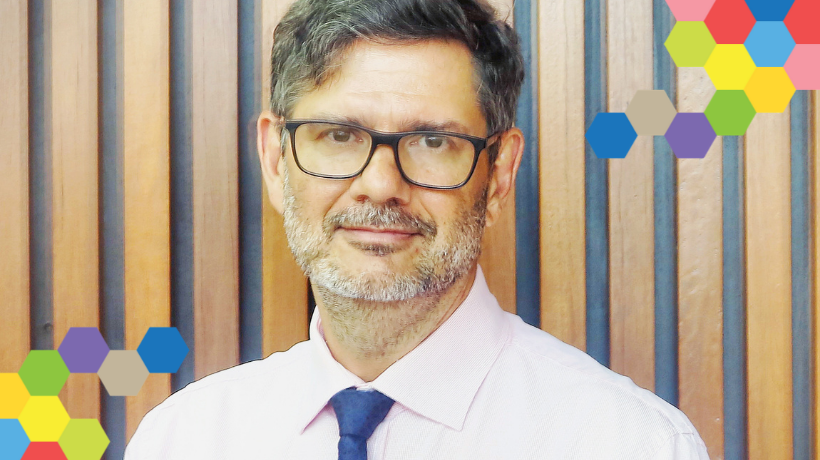
Adolescence is a stage of rapid growth and development. Identifies are forged, emotions can run high, and the skills required for adulthood begin to take shape. But for those who develop bone sarcoma, which is among the 10 most common cancers affecting Australian teenagers and young adults, this formative life stage can be tragically disrupted.
The five-year survival rate for sarcomas is as low as 65 percent and options for patients with incurable disease remain very limited.
For oncologist and researcher Professor David Thomas, these young Australians simply haven’t “had their fill” of life. This is one of the motivations behind his significant work in the development of adolescent and young adult oncology.
Read more: World-first clinical trial for sarcoma
In addition to his roles as Principal Research Fellow at National Health and Medical Research Council (NHMRC), Director of The Kinghorn Cancer Centre and CEO of Omico: the Australian Genomic Cancer Medicine Centre, David is also the chief investigator of a world-first clinical trial into a new treatment for sarcoma, which is supported by The Kids’ Cancer Project.
“I've always thought adolescent and young adult oncology to be a terribly important area to work on,” says David. “It's an area of unmet need - we have systems designed to protect children through paediatric oncology and we have adult oncology, which focuses on the bulk of adult-onset cancers.”
“For a young person to die from cancer is tragic because they haven't had their fill of life and the impact of losing life at such a young age is so devastating for family members.” - Professor David Thomas, Garvan Institue of Medical Research
A world-first clinical trial
David began his medical training at University of Melbourne and undertook post-doctoral research at Harvard Medical School in the late 1990s. Returning to Melbourne two decades ago, he set up his own laboratory and in 2018 he established Omico, which brings together the country’s major cancer centres, leading research institutes, governments, industry partners and patients to facilitate the deliver of genomic cancer medicine clinical trials to Australians suffering from advanced and incurable cancers.
The current phase II clinical trial, which is a collaboration between Omico, the Garvan Institute of Medical Research and the University of Sydney’s NHMRC Clinical Trials Centre, is investigating if existing therapy for psoriasis can help treat patients with sarcomas, which are rare cancers arising in the connective tissues, like bone and muscle. In particular, the trial focuses on osteosarcoma, a rare but aggressive form of bone cancer that most commonly affects teenagers and young adults.
The body has an elaborate system to stop cancer from occurring within its cells while the immune system keeps a watchful eye to kill cancer cells before they take hold. For cancer to occur, both defences must be breached
“What we've discovered through research into sarcomas over the past five to 10 years is that there are parts of the immune system that cancers cunningly exploits to promote its growth,” says David.
“They actually use the immune system, and some of the molecules that are important in immune responses, to grow.”
One of those molecules, called Interleukin-23 (IL23), is the target of drugs for psoriasis.
Read more: Targeting IL23 in bone and soft tissue sarcomas
“What we've done is take the logical next step to see whether we can repurpose the drug for psoriasis to try and help patients with bone sarcomas, but also soft tissue sarcomas.” - Professor David Thomas, Garvan Institute of Medical Research
The trial, which is open through the Omico and MoST (Molecular Screen Programme) network, is now open at 15 centres around the country. It will examine how 32 patients with advanced osteosarcoma and soft tissue sarcomas respond to the anti-IL23-targeting treatment. Within its first six weeks, five patients had been recruited.
“I'm very pleased with the rate of recruitment to date,” says David. “I think it speaks to the levels of unmet need, but also to the good fortune in being able to design a study capable of enrolling patients quickly and answering this clinical question as fast as possible. It's the first time this question has ever been asked and we'll hopefully find out the answer within the next 18 months.”
Funding is “absolutely essential”
Without the vital funding the study has received, an answer may never have been found. While a general government grant enabled Omico and MoST to design the trial’s network and platform for implementation, David says conducting such a trial can cost in excess of $800,000.
“Funding makes a difference between being able to go ahead or waiting for our turn in the pecking order,” he says. “And, unfortunately, rare cancers like this are often lower in the pecking order because they can be perceived to be less important than more common cancers.
“Of course, there's only so long that kind of situation can go on without creating inequities in care,” adds David. “That's one of the reasons why I'm so pleased at the rate of accrual for this trial. The fact that we've had five patients in the space of six weeks is possibly the fastest accruing sarcoma study I've experienced, and funding has been absolutely essential.”
The Kids’ Cancer Project is proud to be collaboratively supporting the IL23 study alongside the Cooper Rice-Brading Foundation, Australian Government, NSW Office of Health and Medical Research, SunPharma, Matthew Fisher Sarcoma Research Fund and Daniel Allchin Race for a Cure.
